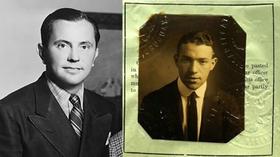Stories of Standards: “April in Paris”

Tune in to Jazz with Victor Cooper – weekdays from 6-9 a.m. MT – for Stories of Standards to hear our favorite versions of this song all week long starting Monday, May 7!
Stories of Standards is sponsored by ListenUp – If you love music, you’ll love ListenUp.
“Well, we really meant you to visit Paris in May, but the rhythm required two syllables.” – Vernon Duke|
“April in Paris” by Vernon Duke and E Y Harburg was written for the 1932 Broadway revue “Walk a Little Faster”. The producers had a Left Bank setting and wanted a romantic song to go with it. Vernon Duke and Yip Harburg obliged with “April in Paris” and took their cue from Dorothy Parker, who was said to have been on the set at the time and had expressed a desire to be in Paris in April. After the show closed jazz singer Marian Chase used it in club dates and persuaded a number of others to add the song to their repertoires. Count Basie used organist Wild Bill Davis’ arrangement in the 1955 recording which renewed interest in “April in Paris” after several lackluster years. This is also the song Count Basie played in “Blazing Saddles”.
03-1969) wrote some of the most popular songs of the 1930s, including “April in Paris” and “Autumn in New York” (for which he also wrote the lyrics). He began his studies in classical music in Kiev at the age of 11, went to Constantinople where he played piano in a bar following the Russian Revolution, moved to New York where he became a friend of George Gershwin, and moved to Paris in 1924 where he wrote ballets for Sergei Diaghilev. Throughout his life he wrote music both classical and jazz, poetry, books (including his autobiography) and magazine articles.
Edgar Yipsel (Yip) Harburg (1903-1969) wrote parodies of songs while in grade school. Later he attended high school and college with Ira Gershwin, who collaborated with him on a light verse column. A brief stint as a journalist in South America was followed by writing light verse for a local newspaper and co-owning an electrical appliance company which went bankrupt after the crash of 1929. Known as “Broadway’s social conscience”, Harburg wrote lyrics to more than 600 songs for Broadway and Hollywood, as well as two books of poetry. A member of the Socialist Party rather than the Communist Party, he was blacklisted in 1947 and returned to Broadway. He remains best known for “Buddy, Can You Spare a Dime”, “The Wizard of Oz” and “Finian’s Rainbow”.
9(MDA3NDU1Nzc2MDEzMDUxMzY3MzAwNWEzYQ004))
Become a Member
Join the growing family of people who believe that music is essential to our community. Your donation supports the work we do, the programs you count on, and the events you enjoy.
Download the App
Download KUVO's FREE app today! The KUVO Public Radio App allows you to take KUVO's music and news with you anywhere, anytime!
